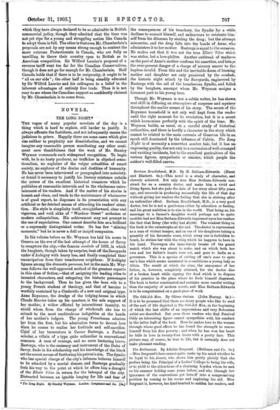NOVELS.
THE LONG NIGHT.*
'THE vogue of many popular novelists of the day is a thing which is hard to explain, still harder to justify. It .always affronts the fastidious, and not infrequently causes the judicious to grieve. Happily there are some cases which give rise neither to perplexity nor dissatisfaction, and we cannot imagine any reasonable person manifesting any other senti- ment save thankfulness that the work of Mr. Stanley Weyman commands such widespread recognition. To begin -with, he is no hasty producer, no trafficker in slipshod sensa- tionalism, no exploiter of the vulgar actualities of smart society, no explorer of the drains and dustbins of humanity. He has never been interviewed or paragraphed into notoriety, -or found it necessary to justify his literary existence outside the covers of the excellent historical romances which he publishes at reasonable intervals and to the wholesome enter- tainment of his readers. And if the matter of his stories is honest, and clean, and tends to the maintenance of whatsoever is of good report, he dispenses in its presentation with any artificial or far-fetched means of attracting his readers' atten- tion. His style is simplicity itself, straightforward, clear and vigorous, and void alike of " Wardour Street" archaism or modern colloquialism. His achievement may not prompt to the use of superlatives. One cannot describe him as a brilliant -or a supremely distinguished writer. He has few " shining moments," but he is never a dull or insipid companion.
In the volume before us Mr. Weyman has laid his scene in -Geneva on the eve of the last attempt of the house of Savoy to recapture the city,—the famous escalade of 1602, in which the burghers, though taken by surprise, beat off the Savoyards under d'Aubigny with heavy loss, and finally completed their -emancipation from their treacherous neighbour. D'Aubigny figures among the dramatis personae, but in the main Mr. Wey- man follows the well-approved method of the greatest experts in this class of fiction,—that of assigning the leading roles to Invented characters, and relegating the historic personages to the background. Thus he has given the beau role to a young French student of theology, and that of heroine is worthily sustained by a Cinderella of a new and original type. Anne Royaume, the drudge of the lodging-house in which Claude Mercier takes up his quarters, is the sole support of her rnother, a widow afflicted by intermittent insanity, to shield whom from the charge of witchcraft she has to submit to the most unchivalrous indignities at the hands of her mother's lodgers. The young Frenchman admires her from the, first, but his admiration turns to devout love when he comes to realise her fortitude and self-sacrifice. Chief of her tormentors is Caesar Basterga, a Paduan scholar, a villain of a type quite unfamiliar in conventional romance. A man of courage, and no mere hectoring bravo, Basterga, who is the emissary and instrument of the Duke of Savoy, Ands in his scholarship and his knowledge of the black art the surest means of furthering his patron's aim. The Syndic who has special charge of the city's defences believes himself to be attacked by a mortal disease, and Basterga gradually feels his way to the point at which he offers him a draught of the Elixir Vitae in return for the betrayal of the city. Distracted between an ignoble longing for life and fear of • The Lem Night. By Stanley Weyman. London: Longmans sad Co. Da.] the consequences of his treachery, the Syndic for a while declines to commit himself, and endeavours to extricate him- self from his dilemma by stealing the drug ; but the attempt miscarries, and the drug falls into the hands of Anne, who administers it to her mother. Basterga is equal to the occasion. He makes out that it was not the true Elixir Vitae which was stolen, but a love-philtre. Another outbreak of madness on the part of Anne's mother confirms his assertion, and brik.Ta the ever-present danger of a charge of sorcery nearer to the hapless invalid. From this and the inevitable doom of burning mother and daughter are only preserved by the escalade, the historic night attack by the Savoyards, engineered by Basterga with the aid of the treacherous Syndic, and foiled by the burghers, amongst whom Mr. Weyman assigns a. foremost part to his young hero.
Though Mr. Weyman is not a subtle writer, he has shown real skill in diffusing an atmosphere of suspense and mystery throughout the earlier scenes of his story. The secret of the Royaume household is not only well kept from the reader until the right moment for its revelation, but it is a secret which harmonises perfectly with the spirit of the time. Mr. Weyman builds, as usual, on a careful study of historical authorities, and there is hardly a character in the story which cannot be related to the main currents of Genevan life in au epoch still dominated by the influence of Calvin. The Long Night is of necessity a somewhat sombre tale, but it has an engrossing quality, due not only to a succession of well-arranged and exciting incidents, but to the excellent portraiture of the, various figures, sympathetic or sinister, which people the author's well-filled canvas.


















































 Previous page
Previous page